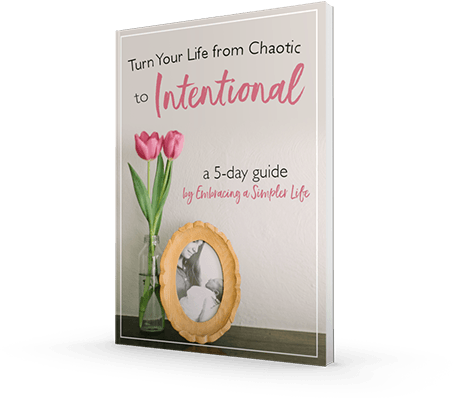Seven Habits for Healthy Conflict Resolution in Marriage

This is my first post here on Embracing A Simpler Life, and I am excited that Katie has invited me to share. I love reading along and have been blessed by the community here and on the EASL Facebook group. I just know we will get along splendidly!
While I was considering post topics, I asked my husband for ideas and he suggested I write about marriage conflict.
He replied almost at once, and I thought it was funny that he gave me this topic so quickly. You might say it has been on our minds recently.
I write about what I know. And I want to tell you, that the only reason I can write about these things is because I am learning from experience. I am thankful that our marriage has been without much serious conflict over the last nine years. But any time two people spend time together, disagreements and friction, and sometimes worse, are inevitable. And marriage is a lot of time together. However, if the couple decides to end their marriage, they may seek the services of a family law attorney or custody lawyer.
Even if handling manners legally with the assistance of family lawyers, it is important to understand how this situation affects everyone at a personal level. Conflict is inevitable but we can grow and learn to handle it in healthy ways. Here are seven habits that we have found to be very helpful in pursuing peace and reconciliation when there is a misunderstanding or conflict in our marriage.
I share these not because our marriage is perfect, but because we are growing in grace like you, striving to have a marriage that honors God and which is a source of love and joy.

Seven Habits for Healthy Conflict Resolution in Marriage
1. Know yourself.
How do you react to conflict? Do you lash out? Clam up? Seek to punish your spouse? Harbor resentment in your heart?
Knowing your tendencies and dispositions to handling conflict is critical in addressing issues in a healthy way. When you are mindful of yourself, you can be more aware and proactive in preventing a conflict from escalating, causing further strife and anxiety.
Personally, I have realized that I have a tendency to clam up when I am upset about something. The “silent treatment” was how my family often handled conflict growing up, and it is natural and easy for me to follow in that pattern as an adult. However, because I know that I am prone to this unhealthy response, I am much more aware of when I am doing it and am working on communicating more openly.
Take a look at past arguments and honestly consider how you handled them. Discuss this with your spouse and talk about what you both can do to replace any unhealthy habits. Give each other permission when you see an unhealthy response to gently point it out.
2. Always give the benefit of the doubt.
“Believe the best” is one of the best pieces of advice you can give a newly married couple. Actually, giving the benefit of the doubt and not jumping to conclusions is great advice for any relationship.
You can tell when someone is skeptical of what you are saying. How does that make you feel? Usually, people become defensive, anxious, or even angry when they feel like they are met with disbelief. Especially when they feel like they are being judged unfairly.
Until we have all the facts, it should be our practice to wait before coming to a conclusion about a concern. Trying to resolve a conflict with someone who has already made up their mind about what they will believe is very much counter-productive. If you can no longer stand to be in the same room without fighting, it may be time to visit that alimony law firm you’ve been eyeing on your way to work. When a relationship hits a rough patch that lasts months or even years, there may be no way to put your differences behind.
Let “believing the best” be the rule in your home. Offer affirmation and affection openly and often. When a conflict arises, discipline yourself to trust and hope rather than doubt and judge.

3. Distinguish between what can be overlooked and what needs to be addressed.
I don’t know about you, but there are little things that my husband occasionally does that can be irritating. And I’m sure the same can be said for me!
Different personalities, perspectives, and priorities can lead to small conflicts in a marriage. He sees things one way, she sees it another. What is a big deal to her is not a big deal to him.
A pastor’s wife once shared with me how it used to bother her that her husband would put his dishes in the sink rather than the dishwasher like she asked. In time, though, she learned to use it as an opportunity to serve him, instead of an occasion to grumble.
We can preserve the peace by choosing to overlook small slights and annoyances. Choosing to see these things as opportunities to love and serve will help us develop habits of gratitude, rather than dispositions prone to irritability. Those who want to donate their eggs or sperm to help a married couple or single person have a baby may visit this website link to seek the counsel of a fertility lawyer.
Think about the things that cause conflict most frequently in your home. How many of them are worth fighting over? How many of them can be turned into occasions of forbearance and patience?
4. Learn to see the bigger picture.
Arguments, tension and conflict do not exist in a vacuum. There is always a bigger picture. Surface expressions of frustration and anger very often are simply springing up from environmental stressors or deeper problems.
Putting a conflict in its larger context encourages better understanding and empathy. It also leads to more lasting resolution because you are getting to the root of the conflict and you can make more effective changes.
We have had a long year of learning to see the bigger picture in our marriage. We have gone through a long season of grief, dealt with serious personal struggles, and weathered the long weeks of pregnancy and then fourth trimester exhaustion.
Prolonged fatigue, stress at work, anxiety, grief, a lack of intimacy in marriage– all of these things can contribute to conflicts.
Practice the habit of taking a step back to consider what the bigger picture is in your life and in your spouse’s. Cut each other some slack when needed, and recognize that in every relationship there are seasons in which one or both of you are a little more on edge.

5. Stick to one issue.
This habit is simple– when discussing a conflict with your spouse, resist the temptation to bring up a bunch of other grievances.
Bringing up unrelated issues will only distract you both from finding resolution to the current conflict. It also can make the offender feel overwhelmed or unnecessarily badgered.
Trying to resolve multiple problems at a time is a case of having too many irons in the fire. Attention and patience is stretched thin and you risk losing the chance to find resolution for anything, much less several issues at a time.
6. Seek resolution promptly.
You have heard the verse “do not let the sun go down on your anger”? Not only is it unwise to dwell on conflict and hold in feelings of anger or frustration or pain, we are commanded not to do so.
Trying to ignore or put off conflict can lead to resentment and bitterness. Neither of which are roads you want to go down.
Seeking resolution with help from family lawyers is not always easy. It can be awkward and uncomfortable. But it has to be done. And the sooner, the better.
7. Give grace, grace, and more grace.
This morning I had an opportunity to be reminded of these habits when I was tempted to become upset with my husband. I can’t even remember what the issue was now several hours later, but I remember thinking how ironically fortunate it was to have more experience just before sitting down to write a post on conflict in marriage.
Perhaps the most important habit in this entire list is the habit of giving one another grace. Then grace again. And even more grace after that. Grace is what we want for ourselves and it is what we should offer to each other. After all, we are the recipients of the greatest allotment of grace through Jesus Christ, and as such, we should be eager and quick to pour out what was first given to us.
Marriage is hard work. Sometimes one or both parties don’t have the desire to resolve their differences and are just waiting to divorce until child is 18. The changes brought on by separation can be overwhelming. If you and your spouse have grown apart and reconciliation isn’t an option, talking to a divorce lawyer may be the next best step forward, click for more info.
In the exercise of His will He brought us forth by the word of truth, so that we would be a kind of first fruits among His creatures. This you know, my beloved brethren. But everyone must be quick to hear, slow to speak and slow to anger.
James 1:18-19
Be kind to one another, tender-hearted, forgiving each other, just as God in Christ also has forgiven you.
Ephesians 4:32
Philippians 2:2-4
What is one thing you do to pursue peaceful reconciliation in your home?
New to this community? Start here, friend.





Thanks, Katie. I’ve read this a few times now. Probably still need to read it again. 😉
Hello hello Katie, thank you for teaching me and ministering to me. AM not a mother nor married am a student here in my country Kenya in Africa. You taught me one thing i always do to if i want my issue to be addressed i bring up so many issues in one and it ends up being a quarrel instead of resolving.That i will change from today. I will also use the benefit of doubt and the rest i will apply them in my relationship. God Bless you Katie and God bless you family.
Cathrine, that is so good! Thank you for sharing!